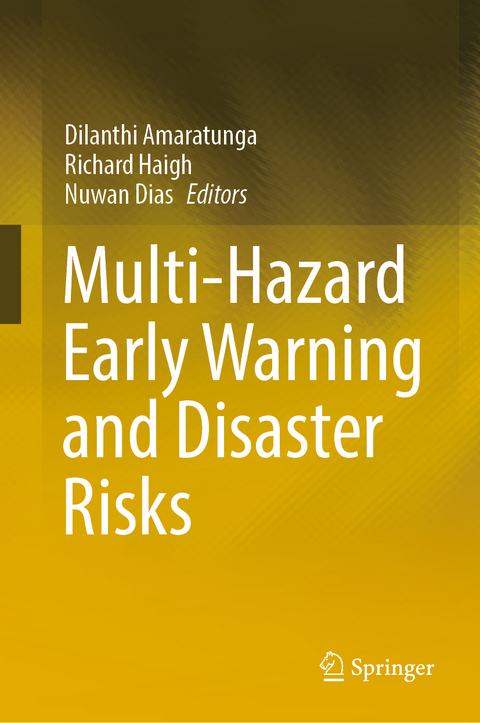
Multi-Hazard Early Warning and Disaster Risks
Springer International Publishing (Verlag)
978-3-030-73002-4 (ISBN)
This book presents a collection of papers under the theme of multi-hazard early warning and disaster risks. These were selected from the presentations made at the International Symposium on Tsunami and Multi-Hazard Risks, Early Warning and Community Awareness in supporting implementation of the Sendai Framework for Disaster Risk Reduction 2015-2030. This conference aimed to recognize achievements and to highlight work that still needs to be carried out. The conference promoted collaboration among academia, research institutions and disaster management offices, and further encouraged multidisciplinary and multi-sectoral interaction
This International Symposium on Multi-Hazard Early Warning and Disaster Risk Reduction provided an important opportunity to reflect upon our progress to date in tackling disaster risk, but also to consider some of the challenges and opportunities that lay ahead of us.
A particular focus of this event wasMulti-Hazard Early Warning. During the negotiations for the Sendai Framework, countries and partners highlighted the need to:
1. Continue to invest in, develop, maintain and strengthen people-centred, end-to-end early warning systems;
2. Promote the application of simple and low cost early warning equipment and facilities;
3. Broaden the dissemination channels for early warning information to facilitate early action.
Countries also called for the further development of and investment in effective, nationally compatible, regional multi-hazard early warning mechanisms. To address these needs, global Target (g) of the Sendai Framework was adopted, namely to "substantially increase the availability of and access to multi-hazard early warning systems and disaster risk information and assessments to the people by 2030".
As illustrated by recent events in Indonesia, it is also vital to address the challenge of cascading hazards that pose a tsunami risk, and the importance of linking tsunami early warning to a multi-hazard environment. However, moving towards a multi-hazard environment is complex and poses many challenges but can bring significant benefits in terms of efficiencies and also in recognising the links between hazards, such as cascading threats. We very much hope that this book will provide an important platform to address these and other challenges in addressing disaster risk, as well as supporting implementation of the Sendai Framework for Disaster Risk Reduction
lt;p>Professor Dilanthi Amaratunga
Professor Dilanthi Amaratunga holds the chair in Disaster Risk Management at the University of Huddersfield, UK. She is a leading international expert in disaster resilience with an extensive academic career that has a strong commitment to encouraging colleagues and students to fulfil their full potential. She provides expert advice on disaster resilience to national and local governments and international agencies including the United Nations Office for Disaster Risk Reduction. She is engaged in many significant disaster risk reduction and management research engagements around the world, in partnership with key academic and other organisational stakeholders. To date, she has produced over 400 publications, refereed papers and reports, and has made over 100 keynote speeches in around 30 countries. Among many leadership roles, she is the joint chief editor of the International Journal of Disaster Resilience in the Built Environment and the chair of the International Conference on Building Resilience (ICBR) series, which she co-created. She is a member of the European Commission and UNDRR's European Science & Technology Advisory Group representing the UK, Steering Committee member of the Frontiers of Development programme, a Collaborative Programme of The Royal Academy of Engineering, The Academy of Medical Sciences, The British Academy and The Royal Society. She is a Fellow of the Royal Institution of Chartered Surveyors (RICS), a Fellow of The Royal Geographical Society, and a Fellow and a Chartered Manager of the Chartered Management Institute, UK. She can be contacted on: d.amaratunga@hud.ac.uk
Professor Richard Haigh
Dr Nuwan Dias
Nuwan Dias is a Research Fellow in Disaster Resilience at the Global Disaster Resilience Centre, University of Huddersfield UK. His research interests include multi-hazard early warning, integration of climate change adaptation to disaster risk reduction and resilience in urban planning and Design. He has delivered over 10 invited speeches and keynote pres
Sendai Framework for Disaster Risk Reduction 2015-2030 / Sustainable Development Goals: Life two years after relocation: Status quo of natural hazard induced displacement and relocation in Kegalle, Sri Lanka.- Development of a legume-based disaster resilient emergency food product.- Applicability of drywall technology in disaster relocation projects: Time-based performance analysis.- Research and Innovation in the Context of Disaster Resilience in the Sri Lankan Higher Education Sector.- Role of the Built Environment in rebuilding Displaced and Host Communities.- Strategy for the establishment of Local Disaster Risk Reduction (DRR) Plans in Sri Lanka: a study on its effectiveness and challenges through a pilot programme.- Disasters, Climate Change and Development Nexus: Food Security Sector in Asia.- The Role and Challenges for Local Governments in Achieving the Resilience of Critical Infrastructure.- Role of Disaster Risk Resilient Cities in Facilitating the Achievement of SustainableDevelopment.- Disaster Risk Reduction: The Impact of PDO on South-west monsoon rainfall over Sri Lanka and monsoon- ENSO relation.- Local responsiveness to changes in climate: A case of underutilized marine and aquatic resources.
| Erscheinungsdatum | 14.09.2021 |
|---|---|
| Zusatzinfo | LI, 892 p. 239 illus., 214 illus. in color. |
| Verlagsort | Cham |
| Sprache | englisch |
| Maße | 155 x 235 mm |
| Gewicht | 1574 g |
| Themenwelt | Naturwissenschaften ► Biologie ► Ökologie / Naturschutz |
| Naturwissenschaften ► Geowissenschaften ► Geografie / Kartografie | |
| Naturwissenschaften ► Geowissenschaften ► Geologie | |
| Sozialwissenschaften | |
| Schlagworte | Communication • disaster risk • Early warning interface • multiple hazards • Technology |
| ISBN-10 | 3-030-73002-6 / 3030730026 |
| ISBN-13 | 978-3-030-73002-4 / 9783030730024 |
| Zustand | Neuware |
| Haben Sie eine Frage zum Produkt? |
aus dem Bereich


